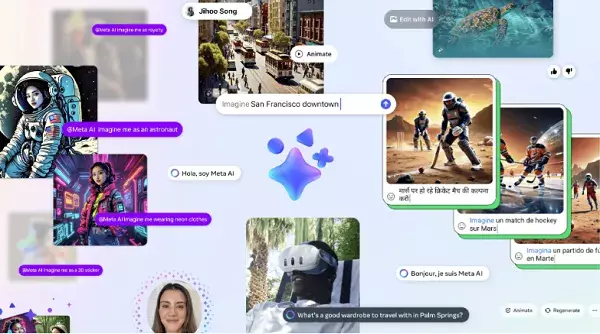Meta’s recent announcement of expanding the Meta AI chatbot to seven additional languages and regions seems like a step forward in the company’s AI development plan. However, upon closer inspection, it appears to be more about increasing ubiquity than actual utility. The fact that half of the connected world already uses Meta-owned platforms like Facebook, WhatsApp, and Instagram means that the AI chatbot will automatically have a significant user base. The real question is whether this reflects true popularity or just the company’s ability to put its products in people’s faces when they open their apps.
One of the new features introduced by Meta is the ability for users to create AI-generated images of themselves directly from the chat stream. This functionality, called “Imagine me,” allows users to transform their photos into various scenarios like being a superhero, a rockstar, or a professional athlete. While this feature may initially attract users due to its novelty, it is reminiscent of Snapchat’s “Dreams” functionality, which tends to lose its appeal quickly. The question remains whether these creative functions add any real value to users or if they are just gimmicks to showcase Meta’s AI capabilities.
Meta is also adding new editing tools for AI-generated images, allowing users to customize them within the chat stream. The ability to add or remove objects, as well as change or edit them while maintaining the main image, is a welcome addition. This feature addresses a common issue with AI-generated images, where users have limited control over the final output. However, the true test of the effectiveness of these editing tools will lie in how user-friendly they are and whether they actually empower users to create more personalized and engaging content.
One of the key concerns raised by Meta’s broad integration of AI content is the potential dilution of the human element in social media interactions. By encouraging users to interact with AI-generated content and chatbots, Meta risks prioritizing efficiency and novelty over genuine social connections. The question of whether bot-generated content enhances or detracts from the social experience on digital platforms remains unanswered. As users are increasingly encouraged to use AI tools in their interactions, the balance between technological innovation and meaningful human connections becomes crucial.
Meta’s decision to allow users to choose which AI model they use for different tasks within the app seems like a technical advancement. However, the utility of this feature may be limited as most users are likely to opt for the most powerful AI model available. Moreover, the complexity of accessing and navigating AI model settings may deter many users from extensively using this option. The challenge lies in striking a balance between technical sophistication and user-friendly design to ensure widespread adoption and usage of AI tools.
The introduction of Meta AI in virtual reality (VR) with selected users in North America marks a significant milestone in the company’s AI development. By enabling hands-free control of VR headsets, real-time information access, and weather updates, Meta aims to revolutionize the VR experience. The potential of AI tools to create immersive VR experiences based on simple text prompts could transform the way users interact with virtual worlds. While Meta’s current focus on AI chatbots may seem disconnected from this long-term vision, it serves as a stepping stone to familiarize users with AI interactions.
Meta’s expansion of AI capabilities raises important questions about the future of AI interaction, the balance between technological innovation and human connection, and the potential of AI tools in shaping virtual experiences. While the company’s efforts to integrate AI into its platforms are commendable, the true test lies in how these advancements empower users, enhance creativity, and foster genuine social interactions in the digital age. As we navigate the evolving landscape of AI technology, it is critical to evaluate the impact of these innovations on our digital habits, social behaviors, and future interactions in a virtual world.


Leave a Reply